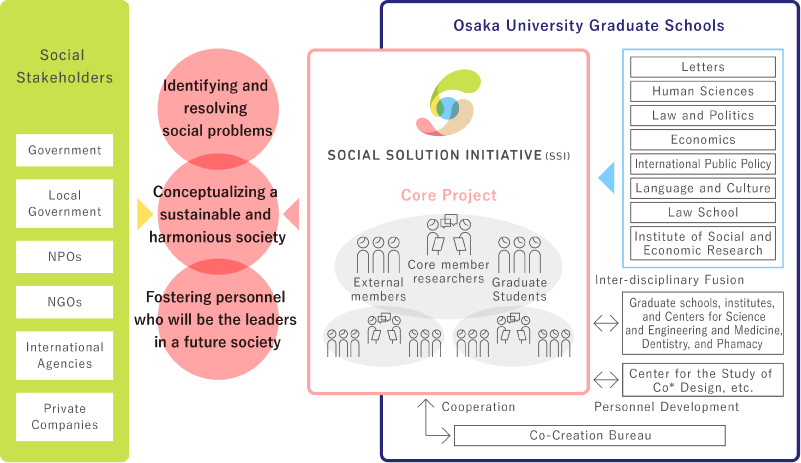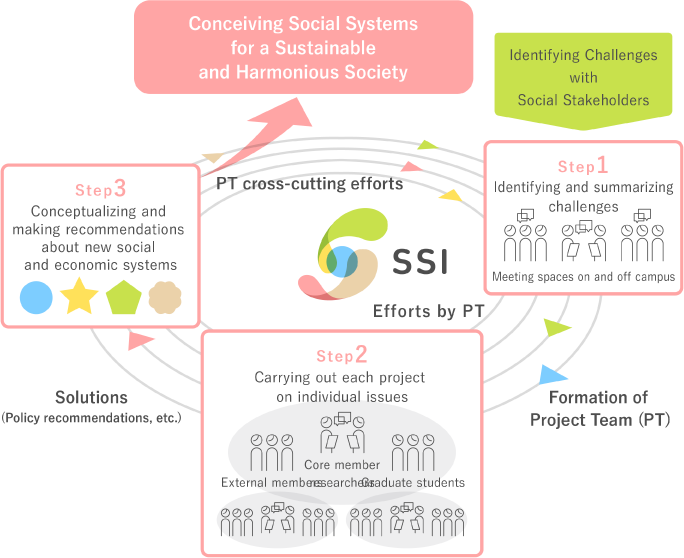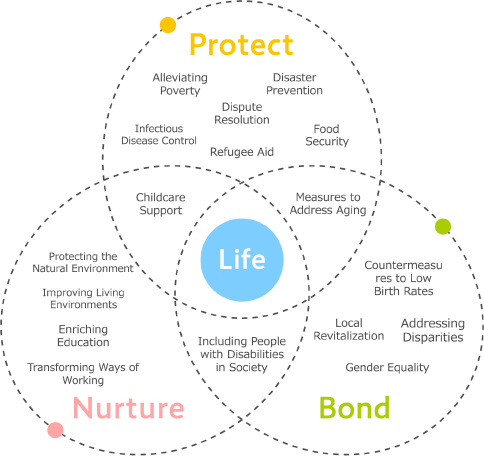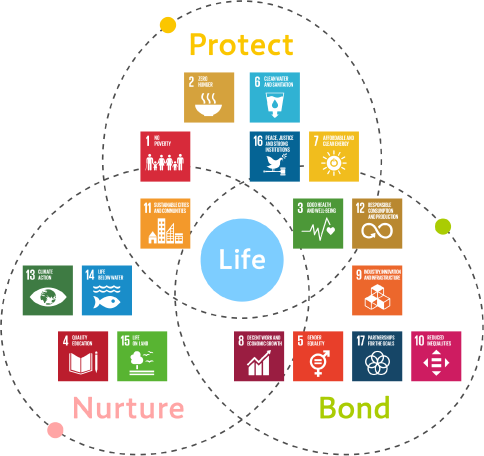Overview of the Social Solution Initiative
What is the SSI
The Social Solution Initiative (SSI) is a new “think tank” at Osaka University that was established in January 2018. It principally aims at identifying and seeking solutions to a variety of social challenges in Japan as well as in the world. In order to achieve this, the SSI collaborates with different stakeholders. While recruiting core members from humanities and social science institutions who have expertise in studying social challenges, it also seeks partnerships with researchers from the natural sciences—including science and engineering, medicine, dentistry, and pharmaceutical sciences. More importantly, it seeks to establish partnerships with a variety of stakeholders such as policy-makers, experts in business firms, representatives of civil society.
The SSI is an organization that will propel us toward the realization of a sustainable and harmonious society and lead diverse activities at Osaka University.

Our Activities
Step 1
After considering what the future of a “sustainable and harmonious society” could be, we will identify and lay out the numerous challenges that must be solved. Specifically, we will host an SSI Salon that will bring together people from inside and outside the university to discuss ideas for a future society and summarize the challenges facing their realization. At this stage, we will start to collaborate with various stakeholders in society as well as researchers.
Step 2
For each challenge that is identified, we will create a “Core Project” team to include core members made up of two or three campus-based researchers. (Core Projects are carried out by SSI itself. Aside from these, we also have “Joint Projects” supported by the SSI). One core member for each Core Project will serve as a project leader. Core members will bring together other members from the university and off-campus research institutions, public sector agencies, and industry. Each team will be composed of 10 to 15 people, hold regular seminars and workshops, and conduct fieldwork as necessary to move forward with research. As a rule, the typical project duration is one to three years. The status of projects will be posted on our website, and incorporating various opinions of our activities will lead to policy recommendations at the end of the project.
Step 3
Through efforts to identify, summarize, and tackle these various problems, we will conceptualize and propose new social systems for bringing about a sustainable and harmonious society. After holding symposia and forums that cut across the project teams, we will propose prospective new systems. Based on these concepts for updated systems, we will identify further problems that need to be solved. In other words, we will return to Step 1 and begin a new round.

The SSI Philosophy
Aims of the SSI: Realization of a Sustainable and Harmonious Society
Humanity has developed civilization to protect, nurture, and bond lives. However, with population increases, the world has been suffering challenges on a planetary scale, such as global warming and environmental destruction, the exhaustion of natural resources, food shortages, and widening disparities. Ignoring these issues will only exacerbate others, such as poverty, famine, infectious disease, civil strife, terrorism, war, and crime. On the other hand, Japan is struggling with its own difficulties, including financial troubles and rural decline, resulting from demographic aging and falling birth rates. We can say that for both Japan and the world, lives are in danger of being threatened, oppressed, and divided. Under these circumstances, the SSI is returning to the origins of civilization to focus on “life” and engage in solutions to social issues by adopting the perspective of “protecting”, “nurturing”, and “bonding” lives. The SSI is an organization that embodies the words of Henri Bergson: “élan vital”, or a vigorous experience of life. We will work toward the realization of a sustainable and harmonious society where each individual can feel this.
The Three Aspects of the SSI: To Protect, Nurture, and Bond Lives
To protect life means to guard human life from threats such as disasters, infectious diseases, war, crime, starvation, and poverty. It means not allowing the interruption of irreplaceable lives born into this world as the result of involuntary deaths.
To nurture life means to find and promote the latent abilities possessed by each person by enhancing living environments, supporting childcare, enriching education, and improving working methods. It also includes nurturing the lives of humans as well as other creatures by such means as protecting the natural environment.
Human beings are unable to live alone. To protect life, as well as nurture it, it is important to forge mutual bonds. Fortunately, human beings are equipped with sympathy—the ability to perceive the feelings of others as their own. To bond lives means to strengthen and expand the ties of affection between people by means of sympathy. It also means bonding lives from the past to the present, as well as into the future. From this perspective, the SSI is working to address social issues that include demographic aging and falling birth rates, regional revitalization, gender equality, the correction of disparities, and the inclusion of people with disabilities in mainstream society.
Three Perspectives and Social Issues
The relationship between the three aspects of protecting, nurturing, and bonding lives can be depicted as in the diagram below.
Circles representing these three viewpoints intersect with each other, and as in the case of childcare support, measures to address aging, and the inclusion of people with disabilities in mainstream society, there are some social issues that can be positioned using multiple overlapping circles.
Furthermore, it is conceivable that even efforts aimed at resolving the same issues can emphasize different perspectives. The SSI will continue its engagement with social issues by maintaining a constant awareness of the three perspectives of protecting, nurturing, and bonding lives.

The SSI and SDGs
The SSI has prioritized the Sustainable Development Goals (SDGs) to be realized by 2030 (adopted in 2015 by the UN General Assembly) as important signposts leading toward a sustainable and harmonious society. The SSI will implement, and support projects related to the SDGs. We have linked the 17 goals and 169 targets highlighted by the SDGs to our objectives of protecting, nurturing, and bonding lives. We will continue to examine the purpose behind these goals and targets, and eventually, the kind of society that can be built upon the successful achievement of the SDGs.

The SSI plans to cooperate with organizations in Japan and overseas. If you are someone who represents an institution that is planning to or is already engaged in an initiative similar to the SSI, or who otherwise agrees with the spirit behind the SSI, please feel free to get in touch with us.

